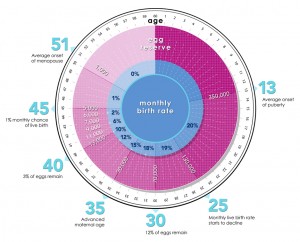He was handsome and healthy, with several degrees and a genius-level IQ. On paper, Donor 9623 embodied the best genetics had to offer. At least 36 children were born using his donated sperm. According to a lawsuit filed by three families, it took almost 14 years before the donor’s true identity was revealed: A schizophrenic college dropout with a felony conviction.
Tag: genetics
Gene Studies Shed Light on Women’s Reproductive Health
Genetics has revolutionized the study of women’s cancers. Now a woman can swab her cheek and learn whether she’s at an elevated risk of developing breast or ovarian cancer. And if she does find a lump in her chest, that woman can take another genetic test to determine whether she’s a good candidate for targeted drug therapy.
New Strategy IDs Infertility-Causing Genes
Infertility affects roughly 15 percent of couples – with many cases resulting from faulty genetics – but the details of underlying genetic causes are largely unknown. Now, Cornell researchers have developed an experimental strategy to identify infertility-causing mutations found in human populations.
Read This Before You Freak Out Over Gene-Edited Superbabies
Sit down America, and let’s talk about making babies. Specifically, designer babies. Because ever since in vitro fertilization made it possible for parents to select embryos with the best genetics, precisely-engineered progeny have been a big fear. And now that a powerful gene-editing technique has been used on human embryos, it’s fine to get a little freaked out. But—here’s the important bit—let’s not leave out the hope of eradicating thousands of diseases, and the potential to make many pharmacological treatments obsolete.
‘Designer Babies’ Debate Should Start, Scientists Say
Rapid progress in genetics is making “designer babies” more likely and society needs to be prepared, leading scientists have told the BBC.
The Truth About Male Fertility: Biological And Environmental Factors Behind Making Sperm Swim
There are plenty of rumors and myths surrounding infertility: both for females and males. Male infertility is caused by a number of factors, such as abnormal sperm production, or disruptions in the size and shape of sperm. Low sperm concentration, blocked sperm delivery, and hormonal problems are also often to blame for infertility.But in addition to genetics and biology, lifestyle and environment play quite a major role too: a man’s age, levels of alcohol and tobacco consumption, possible STD infections, weight, and even exposure to heat can all have an effect on male fertility.
Accurate Editing of Human DNA Now Possible, Say Scientists
A molecular technique that enables any part of the human genome to be altered with extreme precision has been hailed by scientists as a breakthrough in genetics. It is the first time researchers have been able to engineer any part of the genome without introducing mutations, reports The Independent.
Why We Need to Think Differently About Our Genomes
If—like most of us—your entire understanding of DNA and genetics can be traced back to CSI reruns, you’re probably under the impression that your genome is unique; that it defines you completely. But scientists increasingly believe that’s not that case. In fact, we need to start thinking about our genomes differently.
Women Could ‘Evolve’ Out of Menopause and Bear Children Later, Says Scientist
Women could end up routinely bearing children into their fifties and beyond as the menopause dies out, a genetics expert has predicted.
Fertility Reflects Mom’s Age at Menopause
 Women whose mothers experienced early menopause are themselves likely to have an accelerated decline in fertility, Danish researchers found.
Women whose mothers experienced early menopause are themselves likely to have an accelerated decline in fertility, Danish researchers found.
Median serum levels of an important marker of ovarian reserve, anti-Müllerian hormone (AMH), declined by 8.6% (95% CI 6.4 to 10.8,P<0.001) yearly in women whose mothers entered menopause at or before age 45, according to Janne Gasseholm Bentzen, MD, PhD, and colleagues from the University of Copenhagen.
In contrast, women with maternal menopause at ages 46 to 54 had a decline in median AMH of 6.8% (95% CI 5 to 8.6, P<0.001) each year, while those with later maternal menopause had an annual decrease of only 4.2% (95% CI 2 to 6.4, P<0.001), the researchers reported in Human Reproduction.
During recent decades many women have delayed childbearing, with the possible result that they may then have difficulties in conceiving if their ovarian reserve has begun to be depleted and oocyte quality lost. Many population-based studies have demonstrated a strong component of heritability for age at menopause, but whether this influence extends to fertility and ovarian viability has been unclear. Read full article.